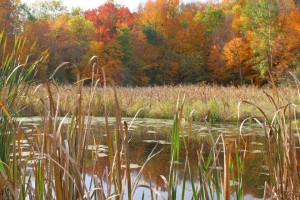Head southwest of Monticello on Wright County Highway 39 and you’ll come around some twists and turns near the south entrance of Lake Maria State Park that will have you feeling like you’re in the middle of the north woods.
Nestled in this area, less than an hour’s drive from the Twin Cities metro and in the heart of northern Wright County, is the home of Kathy and Bob DeBoer, a couple of longtime educators who are probably best known by their neighbors for housing a few St. Bernards, those huge dogs famous for rescuing hikers in the Alps.
But what Kathy and Bob are doing behind the scenes is preparing for the realization of a decade-long dream, thanks to the help of people like St. Michael-Albertville School District ALP teacher Craig Wignes, members of the Minnesota Department of Natural Resources, the University of Minnesota and the Wright County Commission and staff.
The DeBoers, with Wignes as their curriculum director (he’ll step away from STMA schools at the end of this year), are set to launch the Jane Goodall Environmental Services Academy (JGESA) this fall, a school dedicated to teaching students in grades six through 12 via the natural resources right here in their own backyard, using the outdoors to teach lessons based in math, science, English, social studies and history.
 “Everything we want will take a project-based approach to learning,” Kathy said over a cup of tea in her home, not far from where the students will do much of their research and observation. “The kids can design a project to what they want to learn, and everything will apply to the core subjects.”
“Everything we want will take a project-based approach to learning,” Kathy said over a cup of tea in her home, not far from where the students will do much of their research and observation. “The kids can design a project to what they want to learn, and everything will apply to the core subjects.”
If you study a beaver, for example, a student can focus on hydrology, climate, animal behavior, geography and geology all in a six-week span. A final report can use statistics (math) and English skills, as well as audio-visual technology.
“I think one of the misconceptions about charter schools that’s out there is that everything is specialized. If you attend one that’s focused on science, for example, that isn’t all you study,” Wignes said. “Everything you put together falls into those core subjects. We’re held to that standard, just like any other educational system.”
Charter schools are licensed by the Minnesota Department of Education, so students will participate in the standard tests given across the state – MCA exams, DIBELS tests for reading, and so forth. Because it is a public charter school – JGESA will be given its own District No. by the MDE – tuition is free. Space, however, will be limited.
“That’s another misnomer, is that charter schools cost money for you. We’re fully funded. We do a lot of work for grants and donations, but the state had to approve our programming in order to fund the district,” DeBoer said.
It’s something the DeBoer’s have experience with – founding A Chance to Grow in the Northeast Minneapolis Area years ago.
The school also had to work with the University of Minnesota Extension Service and the Minnesota Department of Natural Resources to appease some of the conditions set by the Wright County Commission. The school will meet for classes in space at Camp Courage, but most work will be done outdoors, weather permitting.
“There’s no such thing as bad weather, only bad clothing,” DeBoer said. “Obviously, in extreme conditions we make changes, but there’s a lot outside that can be observed on a normal winter’s day. We’ll be prepared for that.”
 The group chose Goodall, the renowned biologist who studied the plight of the silverback gorilla and rose to fame, thanks to her “Roots and Shoots” program, which is aimed at using environmental sciences to teach students.
The group chose Goodall, the renowned biologist who studied the plight of the silverback gorilla and rose to fame, thanks to her “Roots and Shoots” program, which is aimed at using environmental sciences to teach students.
In a statement about the school, Goodall said she was “honored to have a school named after me that will be advancing the work of Roots and Shoots. How exciting to see the program grow in Minnesota. This will provide the student and teachers a wonderful opportunity to join forces with others taking part in this global movement to make the world better for all living things.”
Goodall will be in Minnesota next year, and DeBoer hopes, though there’s a slim chance, she can show the historic biologist the natural class space the students will use.
“I think it’d be an incredible experience. But it’d just be the icing on the cake. This has been a dream for a long time, and it’s finally pulled together over the last couple of years. We’re really excited to see it become real.”
Currently about 75 students are registered for the inaugural year. About 150 students will be accepted to the school, and if more than 150 sign up there will be a lottery program established.
For more information, check out the school’s new website, or follow the JGESA on Facebook.
Public meetings will be happening throughout Wright County in January and February as the school gears up for the 2015-2016 year.